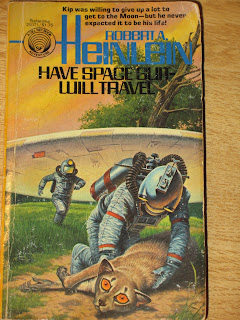Robert A. Heinlein’s Have Space Suit – Will Travel contains several Shakespeare references. The first is to Macbeth. In this section, one of the characters strings together several well-known passages about sleep, including “Sleep, that knits up the ravell’d sleave of care” (p. 61). That line is spoken by Macbeth after the murder of Duncan. The next reference is also to Macbeth, but King Lear is also mentioned. Kip quotes, “Lay on, Macduff, and curs’d be him who first cries, ‘Hold, enough!’” (p. 96). Peewee then says, “King Lear,” and Kip corrects her: “Macbeth. Want to bet?” The next reference is to Hamlet. Kip quotes, “Neither a borrower nor a lender be” (p. 193). This time Peewee accurately identifies the line. She says: “Polonius. He was a stupid old bore.” There is then another Macbeth reference. When Kip learns that a world was destroyed as soon as judgment was passed, a line from Macbeth occurs to him. Heinlein writes, “I gulped and heard an echo in my mind: ‘– ‘twere well it were done quickly’” (p. 223). That line is spoken by Macbeth in the Act I Scene vii.
There are also a couple of references to The Tempest. The alien race is essentially putting humanity on trial, saying, in part, that humans have no art. In response Kip says: “Have you read our poetry? ‘Our revels now are ended: these our actors, as I foretold you, were all spirits, and are melted into air, into thin air: And, like the baseless fabric of this vision, the cloud-capped towers, the gorgeous palaces, the solemn temples, the great globe itself. . . itself – yea – all which it. . . inherit – shall dissolve’” (pages 235-236). Heinlein continues: “I broke down. I heard Peewee sobbing beside me. I don’t know why I picked that one – but they say the subconscious mind never does things ‘accidentally.’ I guess it had to be that one” (p. 236). Soon after that, Heinlein writes: “I looked around at the hall. – the cloud-capped towers. . . the great globe itself – ‘Just this!’ I said savagely” (p. 237). The final reference is to The Merchant Of Venice. A character says, “Slow down; you won’t send anybody, unless I get my pound of flesh” (p. 248).
Have Space Suit – Will Travel was published in 1958. The First Ballentine Books Edition was published in December 1977. The copy I read was the fourth printing, from October 1978.

